#joseph poniatowski
Explore tagged Tumblr posts
Text
Józef Poniatowski
hello! this is my first post, I will post art on this account...
I drew Napoleon's Marshal, Józef Antonii Poniatowski, which is my fav marshal.
he is so fun to draw too!

#napoleon#napoleonic wars#napoleonic era#marshal#napoleons marshals#joseph poniatowski#józef poniatowski#art#digital art#history
92 notes
·
View notes
Text
Since that's all I have to do with my life, I decided to rank the marshals according to their popularity: the stars, the well know, the okay ones, the unknow ones and the who they are ?
(this is my opinion of cours)
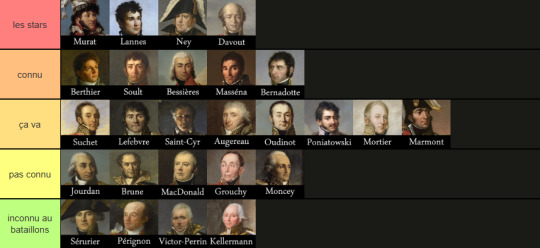
#history#napoleon's marshals#napoleonic era#french history#michel ney#jean de dieu soult#louis nicolas davout#jean lannes#joachim murat#louis gabriel suchet#louis alexandre berthier#jean baptiste jourdan#jean mathieu philibert sérurier#jean baptiste bessières#jean baptiste bernadotte#andre massena#catherine dominique perignon#francois joseph lefebvre#claude victor perrin#françois christophe kellermann#etienne macdonald#emmanuel grouchy#guillaume brune#bon adrien jeannot moncey#nicolas charles oudinot#joseph antoine poniatowski#pierre augereau#auguste de marmont#edouard mortier#laurent gouvion saint cyr
45 notes
·
View notes
Text
I drew all 26 of Napoleon's marshals
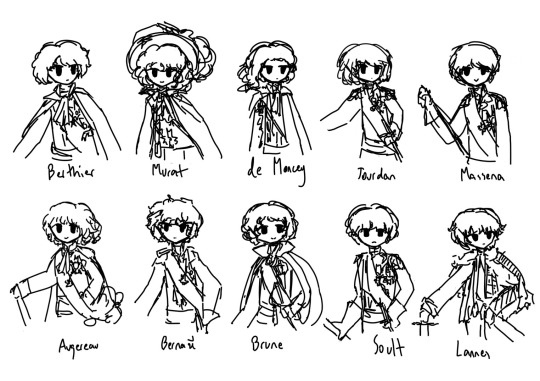
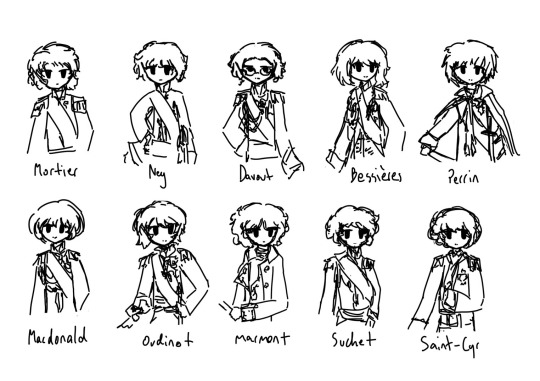
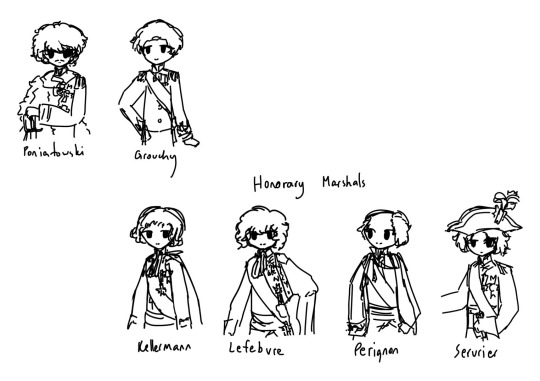
#napoleonic wars#napoleon’s marshals#do i just tag all of them#Louis-Alexandre Berthier#Joachim Murat#Bon-Adrien Jeannot de Moncey#Jean-Baptiste Jourdan#André Masséna#Pierre Augereau#Jean-Baptiste Bernadotte#Guillaume Brune#Jean-de-Dieu Soult#Jean Lannes#Édouard Mortier#Michel Ney#Louis-Nicolas Davout#Jean-Baptiste Bessières#Claude Victor-Perrin#Jacques MacDonald#Nicolas Charles Oudinot#Auguste de Marmont#Louis-Gabriel Suchet#Laurent de Gouvion Saint-Cyr#Józef Antoni Poniatowski#Emmanuel de Grouchy#François Christophe de Kellermann#François Joseph Lefebvre#Catherine-Dominique de Pérignon#Jean-Mathieu-Philibert Sérurier
63 notes
·
View notes
Text
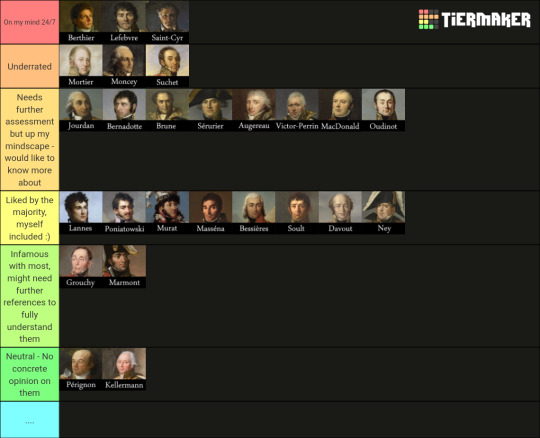
A tier-list of the marshals mainly based on how much I hyperfixate on them. Feel free to drop your own opinions on here :3
Tierlist can be found here!
#napoleons marshals#napoleon’s marshals#napoleonic wars#tagging all 26 hoo boy#louis alexandre berthier#françois joseph lefebvre#laurent de gouvion st cyr#louis gabriel suchet#edouard mortier#bon adrien jeannot de moncey#etienne macdonald#jean baptiste jourdan#claude victor perrin#jean mathieu philibert serurier#guillaume brune#charles pierre augereau#jean baptiste bernadotte#nicolas oudinot#jean lannes#joachim murat#andre massena#jean baptiste bessières#jozef poniatowski#jean de dieu soult#michel ney#louis nicolas davout#auguste de marmont#emmanuel de grouchy#françois christophe de kellermann#catherine dominique de perignon
38 notes
·
View notes
Text
I REALLY LOVE THIS

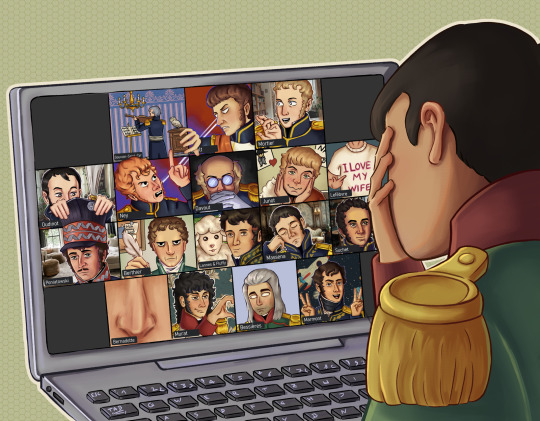
The next time you are dreading a teams call with your co-workers, just be glad you don't have to put up with these dudes. I legit forgot Junot wasn't a marshal. Just imagine Napoleon hasn't found a way to perma ban him yet.
#SAINT-CYR IGNORING THE MEETING AND PLAYING WITH HIS VIOLIN INSTEAD 😍😍#OUDINOT AND PEPI ARE CUTIES FOR REAL.#AND I SEE SUCHET OOOOOOO🤩🤩🤩#Junot stop staring at Naps you already have two wives#michel ney#louis nicolas davout#auguste de marmont#jean andoche junot#laurent de gouvion saint cyr#louis gabriel suchet#józef poniatowski#nicolas oudinot#BERTHIER WHY DO YOU LOOK SO TIRED😇#louis alexandre berthier#yes Lefebvre thank you for loving your wife♡#françois joseph lefebvre#Masséna are you sleeping#BERNADOTTE YOUR NOSE IS TOO BIG.#andre massena#jean baptiste bernadotte#jean baptiste bessières#joachim murat#jean lannes#napoleon bonaparte#ooh Lannes and Fluffy :3#Ney and Soult stop fighting pls#Mortier what are you doing i'm curious#napoleonic era#napoleon's marshals#lovelyy :3
372 notes
·
View notes
Text
The Napoleonic Marshals’ MBTIs according to Internet
(most of them are probably wrong but I'm 100% sure about my fellow INTJs, especially Soult)
(missing because of lack of information : Brune, Grouchy, Jourdan, Kellerman, Macdonald, Moncey, Pérignon, Sérurier, Perrin)
Pierre Augereau : ESTP Jean-Baptiste Bernadotte/Charles XIV : ENFJ Alexandre Berthier : ISTJ Jean-Baptiste Bessières : ISTJ Laurent Gouvion Saint-Cyr : INTP Louis-Nicolas Davout : INTJ Jean Lannes : ESTP François-Joseph Lefebvre : ENTJ Auguste de Marmont : ENTP André Masséna : ENTP Adolphe Mortier : ISTP Joachim Murat : ESTP Michel Ney : ESTP Nicolas-Charles Oudinot : ESTJ Joseph-Antoine Poniatowski : ISTP Jean-de-Dieu Soult : INTJ Louis-Gabriel Suchet : ENTJ
47 notes
·
View notes
Text
Friends, enemies, comrades, Jacobins, Monarchist, Bonapartists, gather round. We have an important announcement:
The continent is beset with war. A tenacious general from Corsica has ignited conflict from Madrid to Moscow and made ancient dynasties tremble. Depending on your particular political leanings, this is either the triumph of a great man out of the chaos of The Terror, a betrayal of the values of the French Revolution, or the rule of the greatest upstart tyrant since Caesar.
But, our grand tournament is here to ask the most important question: Now that the flower of European nobility is arrayed on the battlefield in the sexiest uniforms that European history has yet produced (or indeed, may ever produce), who is the most fuckable?
The bracket is here: full bracket and just quadrant I
Want to nominate someone from the Western Hemisphere who was involved in the ever so sexy dismantling of the Spanish empire? (or the Portuguese or French American colonies as well) You can do it here
The People have created this list of nominees:
France:
Jean Lannes
Josephine de Beauharnais
Thérésa Tallien
Jean-Andoche Junot
Joseph Fouché
Charles Maurice de Talleyrand
Joachim Murat
Michel Ney
Jean-Baptiste Bernadotte (Charles XIV of Sweden)
Louis-Francois Lejeune
Pierre Jacques Étienne Cambrinne
Napoleon I
Marshal Louis-Gabriel Suchet
Jacques de Trobriand
Jean de dieu soult.
François-Étienne-Christophe Kellermann
17.Louis Davout
Pauline Bonaparte, Duchess of Guastalla
Eugène de Beauharnais
Jean-Baptiste Bessières
Antoine-Jean Gros
Jérôme Bonaparte
Andrea Masséna
Antoine Charles Louis de Lasalle
Germaine de Staël
Thomas-Alexandre Dumas
René de Traviere (The Purple Mask)
Claude Victor Perrin
Laurent de Gouvion Saint-Cyr
François Joseph Lefebvre
Major Andre Cotard (Hornblower Series)
Edouard Mortier
Hippolyte Charles
Nicolas Charles Oudinot
Emmanuel de Grouchy
Pierre-Charles Villeneuve
Géraud Duroc
Georges Pontmercy (Les Mis)
Auguste Frédéric Louis Viesse de Marmont
Juliette Récamier
Bon-Adrien Jeannot de Moncey
Louis-Alexandre Berthier
Étienne Jacques-Joseph-Alexandre Macdonald
Jean-Mathieu-Philibert Sérurier
Catherine Dominique de Pérignon
Guillaume Marie-Anne Brune
Jean-Baptiste Jourdan
Charles-Pierre Augereau
Auguste François-Marie de Colbert-Chabanais
England:
Richard Sharpe (The Sharpe Series)
Tom Pullings (Master and Commander)
Arthur Wellesley, 1st Duke of Wellington
Jonathan Strange (Jonathan Strange & Mr. Norrell)
Captain Jack Aubrey (Aubrey/Maturin books)
Horatio Hornblower (the Hornblower Books)
William Laurence (The Temeraire Series)
Henry Paget, 1st Marquess of Anglesey
Beau Brummell
Emma, Lady Hamilton
Benjamin Bathurst
Horatio Nelson
Admiral Edward Pellew
Sir Philip Bowes Vere Broke
Sidney Smith
Percy Smythe, 6th Viscount Strangford
George IV
Capt. Anthony Trumbull (The Pride and the Passion)
Barbara Childe (An Infamous Army)
Doctor Maturin (Aubrey/Maturin books)
William Pitt the Younger
Robert Stewart, 2nd Marquess of Londonderry (Lord Castlereagh)
George Canning
Scotland:
Thomas Cochrane
Colquhoun Grant
Ireland:
Arthur O'Connor
Thomas Russell
Robert Emmet
Austria:
Klemens von Metternich
Friedrich Bianchi, Duke of Casalanza
Franz I/II
Archduke Karl
Marie Louise
Franz Grillparzer
Wilhelmine von Biron
Poland:
Wincenty Krasiński
Józef Antoni Poniatowski
Józef Zajączek
Maria Walewska
Władysław Franciszek Jabłonowski
Adam Jerzy Czartoryski
Antoni Amilkar Kosiński
Zofia Czartoryska-Zamoyska
Stanislaw Kurcyusz
Russia:
Alexander I Pavlovich
Alexander Andreevich Durov
Prince Andrei (War and Peace)
Pyotr Bagration
Mikhail Miloradovich
Levin August von Bennigsen
Pavel Stroganov
Empress Elizabeth Alexeievna
Karl Wilhelm von Toll
Dmitri Kuruta
Alexander Alexeevich Tuchkov
Barclay de Tolly
Fyodor Grigorevich Gogel
Ekaterina Pavlovna Bagration
Ippolit Kuragin (War and Peace)
Prussia:
Louise von Mecklenburg-Strelitz
Gebard von Blücher
Carl von Clausewitz
Frederick William III
Gerhard von Scharnhorst
Louis Ferdinand of Prussia
Friederike of Mecklenburg-Strelitz
Alexander von Humboldt
Dorothea von Biron
The Netherlands:
Ida St Elme
Wiliam, Prince of Orange
The Papal States:
Pius VII
Portugal:
João Severiano Maciel da Costa
Spain:
Juan Martín Díez
José de Palafox
Inês Bilbatua (Goya's Ghosts)
Haiti:
Alexandre Pétion
Sardinia:
Vittorio Emanuele I
Lombardy:
Alessandro Manzoni
Denmark:
Frederik VI
Sweden:
Gustav IV Adolph
65 notes
·
View notes
Text
Józef Poniatowski’s women.
Part V. The rest of ladies who might have been of some interest to him
Good day everyone and let me share with the rest of information I possess on Prince Poniatowski's love interests. (Though, I have to admit, the ladies from this list were the least likely - from all the mentioned in these series of post - to have some kind of affair with Pepi.
To start I would like by Louise of Mecklenburg-Strelitz, the queen of Prussia.
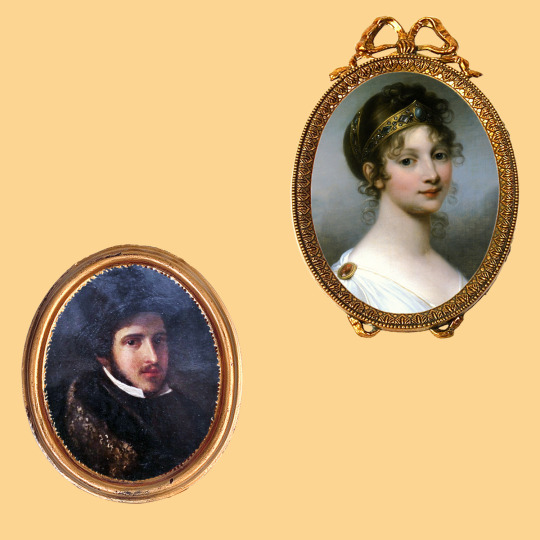
On the right - unidentified artist, miniature portrait of Prince Poniatowski, 19th century. On the left - portrait of Queen Louise by Giuseppe Grassi, 1802.
Prince Józef had the opportunity to meet the wife of the king Frederick William III at least four times, because the royal couple visited Warsaw - which had become a part of Prussia as a result of the third partition of Poland - three times, in 1798, 1802 and 1805. And in 1802 Poniatowski himself had to go to Berlin, to settle the matter of the inheritance left by his uncle Stanisław August.
According to Juliusz Fałkowski, while at Warsaw Prince Józef "…gave a ball and a dinner in the Copper-Roof palace in their honor [the King and Queen of Prussia - A.S.] and was flirting with the Queen everywhere", for which he received the star of the black eagle, although he rather "expected something else from the beautiful queen." After the departure of the royal couple, "he longed a little for the crowned beauty who had easily won his heart in passing."
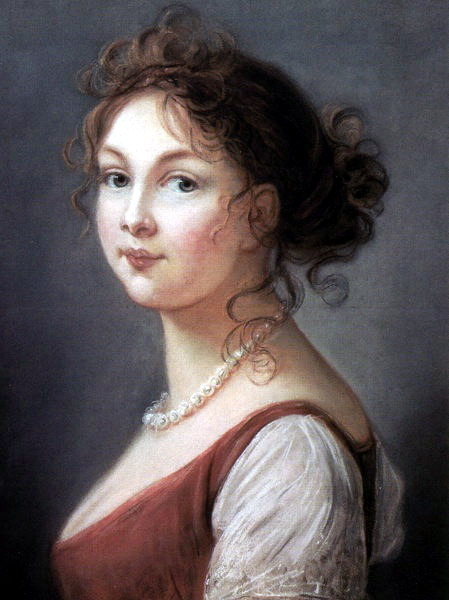
An Elisabeth Vigée-Lebrun painting of Queen Louise, c. 1801
The second source that mentions the relationship between these two is the book by Marian Brandys "Kozietulski i inni", which states (without giving sources, unfortunately) that during Pepi's visit to the capital of Prussia "… it was also said that the beautiful Queen Louise fell in love with in a knightly Pole."
However, if you ask my opinion about the likelihood of an affair between Pepi and the Queen of Prussia, I will say that in my opinion he was "flirting" her to make it easier to solve the inheritance problem. As for the fact that she could also be in love with the prince, I have no opinion because my knowledge about Queen Louise is not very great.
The second lady in today's list will be prince Józef's first cousin once removed, Anetka Potocka (née Tyszkiewicz, the daughter of Konstancja Poniatowska and a grand-daughter of prince Kazimierz, the oldest of the Poniatowski siblings).
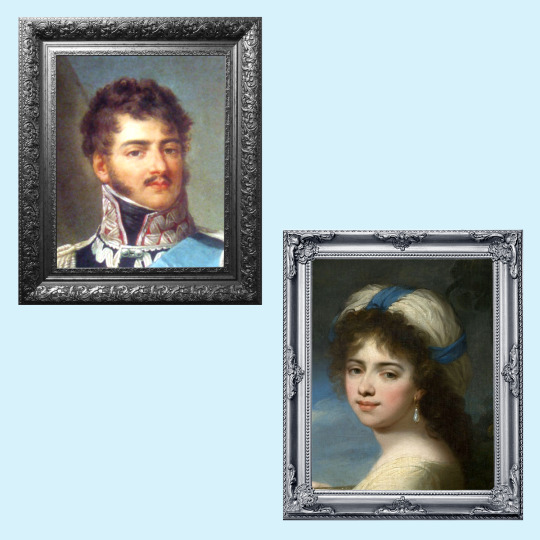
On the left - Poniatowski's portrait by Franciszek Paderewski, on the right - Portrait of Anetka Tyszkiewiczówna, Giuseppe Grassi, 1796.
Born in 1779, she was 16 years younger than Pepi, and she remained unmarried for quite a long time, becoming the wife of the Count Aleksander Potocki in 1805. (Marian Brandys, in the biography of Anetka's uncle prince Stanisław, states that some time before 1791 there was an idea to join all the Poniatowski estates marring Stanisław to his niece, but it was eventually abandoned.) The marriage brought them three children, but after 16 years Anetka asked for divorce and then wedded Colonel Stanisław Dunin-Wąsowicz. During the times of the Duchy of Warsaw, she was a frequent guest at the Copper Roof Palace, visited Paris, witnessed Napoleon's sojourns in Warsaw, with all of those events been described later in her memoirs.
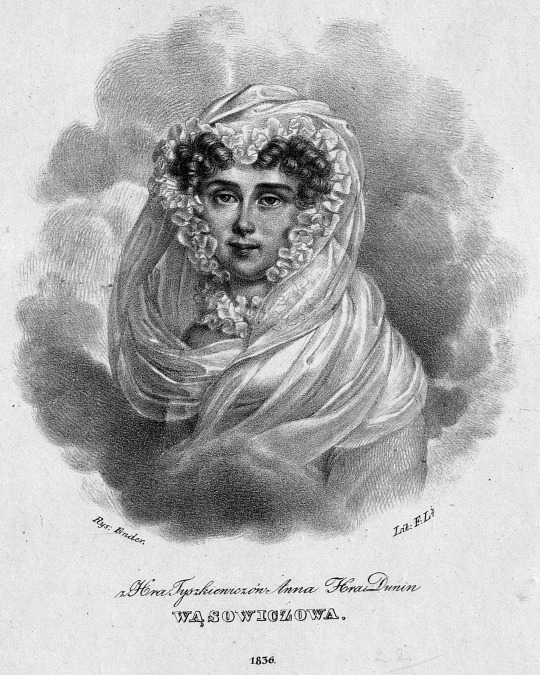
Portrait of Countess Dunin Wąsowicz, Anna née Tyszkiewicz, 1836.
As for her relationship with Prince Józef, it were her own words that made Fałkowski write that "the beautiful prince fell in love with Anetka" although "it was a platonic feeling".
"… Mrs. Aleksandrowa (Anetka Potocka - AS ) herself half-admitted thisin her old age. ''On disait alors que le Prince Joseph avait pour moi un sentiment plus tendre que l'amitié (it was said that Prince Joseph had for me a feeling more tender than friendship),' she would recalled with a dreamy expression on her face."
The second thing that leads historians to believe that Pepi could have distinguished this cousin of his from other relatives is the provision in his will, according to which she was to receive, after the death of the prince's sister, Teresa Tyszkiewicz, his favorite palace in Jabłonna near Warsaw. And when this did happen, Anetka ordered a triumphal arch to be built in the park in memory of Prince Józef.
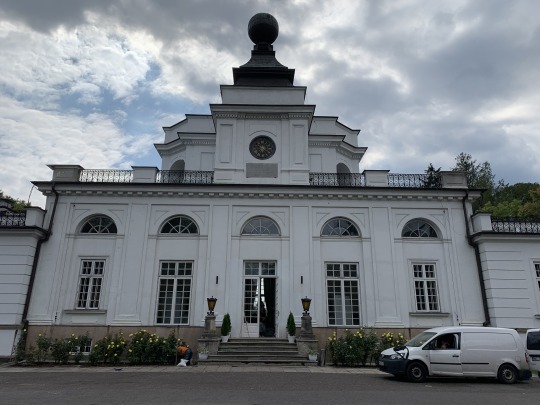
The palace in Jabłonna, 2019
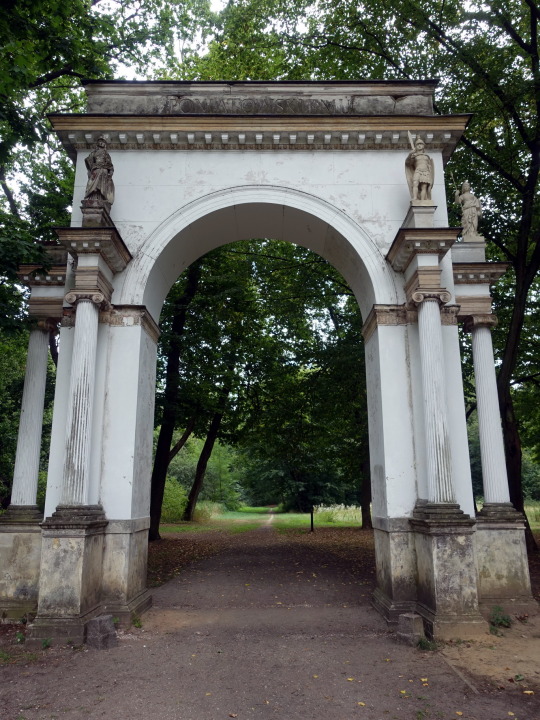
The triumphal arch from Jabłonna's park, 2019
And collage of mine is an illustration to the part dedicated to the rest of the women, whose portraits I wasn't able find. And honestly, the evidence that they might have been Prince Józef's love interests is very weak. But, since historians from time to time do mention these ladies' names, I thought them worth being included as well…
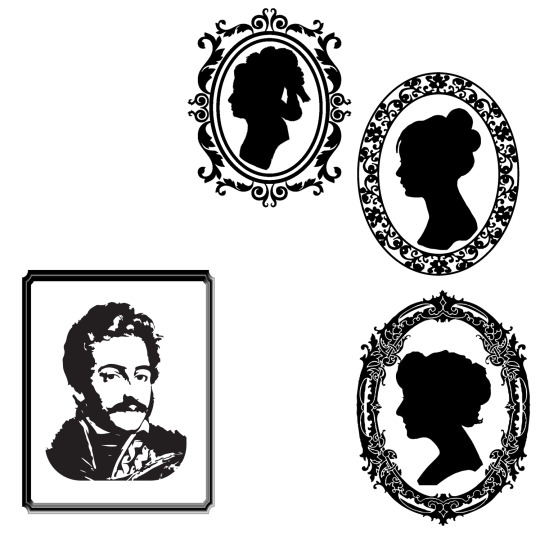
For example, in the prince's testament, together with Henriette de Vauban, Zofia Czosnowska and the above mentioned Anetka Potocka, there was mentioned Elżbieta Merlini, the daughter of Dominique Merlini, an Italian architect, the last main builder of the Polish-Lithuanian Commonwealth. But such concern for the architect's daughter may have been explained by a sense of moral debt to her father, which the prince Józef inherited from King Stanisław with the rest of the things.
Then, the list of Pepi's women sometimes complemented by another "Elżbieta" - Cichocka (although her real names were Emilia Karolina - or Katarzyna) née Bachmińska I° voto Szymanowska, II° voto Cichocka, III° voto Abramowiczowa. It is said she even sojourned in Jabłonna before 1810, until being apparently forced by Zofia Czosnowska to leave the place. After that Madame Cichocka went to Vilna, where she married her third husband. However, what IMHO should be taken into account in regards with this lady is that her second husband, Michał Cichocki, was an illegitimate son of Stanisław August, which might have made Prince Józef consider her a relative and thus take care about.
The same can be said about Madame Kicka - Józefa Martyna Rozalia née Szydłowska, who was a sister of Elżbieta Grabowska, another mistress of King Stanisław.
Sometimes the names of women who were friends and companions of Madame de Vauban are also included to the list of prince Józef's love interests. Those are: Anna Krasińska, a relative of general Krasiński and the wife of Mikołaj Oppeln-Bronikowski; Salomea Wielhorska née Dembińska; Anna Trębicka née Czerska, future wife of general Kamieniecki, and Józefa Potocka née Sollohub.
PS. As the regular visitors to the Copper Roof Palace are as well mentioned two ladies of the surname Walewska: Józefina née Lubomirska, the wife of Adam Walewski and the future wife General Witt, and Maria, the wife of Anastazy Walewski. The first of them was known for her kind of loose behavior, so presumably she might have at least flirted with Pepi; the second one is the famous Maria Walewska, but all I know about her makes me think her love for the emperor left no room in her heart for other men.
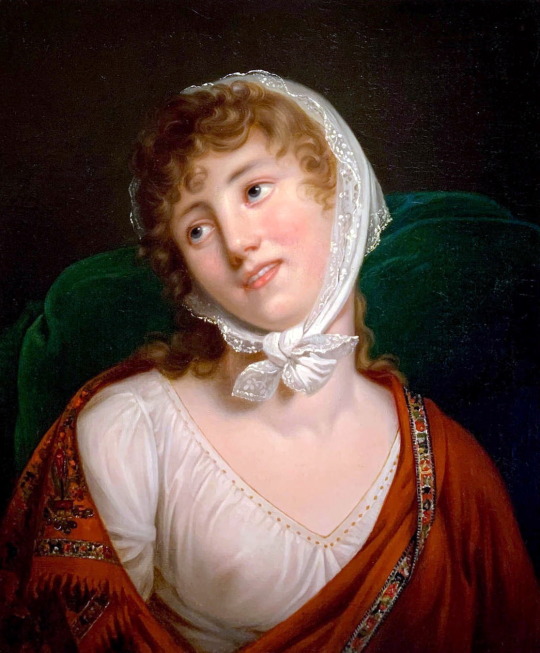
Portrait of Maria Walewska by Robert Lefèvre
#poniatowski#józef poniatowski#józef poniatowski’s women#queen Louise of Prussia#Giuseppe Grassi#Anetka Potocka#Jabłonna#Jabłonna palace#Maria Walewska#Robert Lefèvre
13 notes
·
View notes
Text

Commandant en Chef Prince Joseph Poniatowski by Jan Chelminski, 1913.
Many works of his on wikimedia commons
8 notes
·
View notes
Text
OOC: The Napoleonic Askblog/Roleplay Scene Directory
Here's an Out Of Character post listing the blogs I'm aware of in the Napoleonic RPF Roleplay Scene! It's OOC because Lannes would want to make sarcastic remarks with typos.
If you want (or don't want) your blog on this list, message me and whether you want a main/other blog associated with your name or whether you want to be anonymised! Also happy to include non-Frenchmen and Frev folks.
Doubles or multiple versions of people are welcome, this is a varied afterlife. We all have our different ideas for what this afterlife is like as well.
Feel free to reblog or link to this!
And now we have a OOC discord server to chat about all of this! Feel free to join if you'd like!
The Marshalate
armagnac-army - Jean Lannes, Duke of Montebello - played by cadmusfly
murillo-enthusiast - Jean-de-Dieu Soult, Duke of Dalmatia, and ADCs - played by cadmusfly
@le-brave-des-braves - Michel Ney, Prince of the Moskva, Duke of Elchingen, and ADCs - played by @neylo
@your-dandy-king - Joachim Murat, King of Naples - played by @phatburd
@chicksncash - André Masséna, Prince of Essling, Duke of Rivoli, and others - played by @chickenmadam also playing as his ADC, with appearances from Marshal Augereau, the Cuirassier Generals d'Hautpoul and Nansouty, and the Horse Grenadier General Lepic
@your-staff-wizard - Louis-Alexandre Berthier, Prince of Neuchâtel and Valangin, Prince of Wagram - played by @chickenmadam, as above
@perdicinae-observer - Louis-Nicolas Davout, Prince of Eckmühl, Duke of Auerstaedt - played by @mbenguin
@bow-and-talon - Laurent de Gouvion Saint-Cyr, Marquis of Gouvion-Saint-Cyr
@france-hater - Jean-Baptiste Bernadotte, or Karl XIV Johan of Sweden, played by @deathzgf also includes the Duke of Wellington and Prince Pyotr Ivanovich Bagration
@simple-giant-ed - Édouard Mortier, Duke of Treviso, played by @isa-ko
@bayard-de-la-garde - Jean-Baptiste Bessières, Duke of Istria
@le-bayard-polonaise - Prince Józef Poniatowski of Poland
@oudinot-still-alive - Nicolas Charles Oudinot duc de Reggio, played by @spaceravioli2
@beausoleil-de-bellune - Claude-Victor Perrin, Duke of Belluno
@commandant-des-traitres - Auguste de Marmont, Duke of Ragusa
@tonnerre-d-alsace - François Joseph Lefebvre, Duke of Danzig
@everyones-favourite-marshal - Joachim Murat, King of Naples, played by @xxnightfrostxx
@karlxivjohan - Karl XIV of Sweden or Jean-Baptiste Bernadotte
The Grande Armée
@general-junot - Jean-Andoche Junot, Duke of Abrantes - played by @promises-of-paradise
@askgeraudduroc - Géraud Duroc, Duke of Frioul, Grand-Marshal of the Palace - played by @sillybumblebeegirl, also with cameos from Marshal Bessières shared with your-dandy-king
@trauma-and-truffles - Baron Dominique-Jean Larrey, Surgeon to Napoleon and the Imperial Guard - played by @hoppityhopster23 who also plays his modern assistant
@generaldesaix - Louis Charles Antoine Desaix de Veygoux, most likely would have been a marshal if he lived - played by @usergreenpixel
@messenger-of-the-battlefield - Marcellin Marbot, aide-de-camp of maréchal Lannes - played by @a-system-of-nerds (Inactive)
@le-dieu-mars - Jean-Baptiste Kleber, General - played by @chickenmadam
@puddinglesablonniere - Charles-Étienne César Gudin de La Sablonnière, Gemeral of Davout's Corps
@francoislejeunes - Baron Louis-François Lejeune, ADC to Berthier, Artist and Engineer
@troboi1806 - Jacques de Trobriand, ADC to Marshal Davout
@cynics-and-cynology, Captain Elzéar Blaze
@thehussargeneral - General Antoine-Charles-Louis, Comte de Lasalle, played by upbeatmeeting
@pondicherry-pie - Charles-Rene Magon de Medine, Rear Admiral of the Combined Fleet at Trafalgar, played by chickenmadam
chanceux-et-perdu - Pierre-Charles-Jean-Baptiste-Silvestre de Villeneuve, Vice Admiral of the Combined Fleet at Trafalgar, played by cadmusfly
@general-alex-dumas - Thomas-Alexandre Dumas Davy de la Pailleterie, General of the Republican Army of France
The Bonaparte Family
@carolinemurat - Caroline Murat née Buonaparte, Queen of Naples - played by @usergreenpixel
@alexanderfanboy - Napoleon Bonaparte, The Big Cheese
@frencheaglet - Napoleon II, also known as Franz, Duke of Reichstadt, played by @usergreenpixel
@rosie-of-beauharnais - Rose Beauharnais, also known as Josephine Bonaparte, once Empress of the French
@le-fils - Eugène Beauharnais, Prince of the Empire, Bonaparte's stepson, played by @josefavomjaaga
@jbonapartes - Jérôme Bonaparte, King of Westphalia, Prince of Montfort
@napoleon-bonapartee - Napoleon Bonaparte, The Head Honcho
@rulergreenkeeper - Napoleon Bonaparte, The Exiled Gardener
Other Notable Personages
@askjackiedavid - Jacques Louis David, neoclassical painter - played by @sillybumblebeegirl
@lazarecarnot - Lazare Carnot, mathematician, military officer, politician and a leading member of the Committee of Public Safety
@serpentofotranto - Joseph Fouché, Duc d'Otrante, Comte Fouché, statesman and Minister of Police
@monsieurdetalleyrand - Charles-Maurice de Talleyrand-Périgord, Prince of Talleyrand, statesman and diplomat
@templesorphan - Marie Thérèse of France, duchess of Angoulême
Not French
Russians
@the-blessed-emperor - Tsar Alexander I (Inactive)
@loyal-without-flattery - General Aleksey Andreevich Arakcheev, who runs His Imperial Majesty's Own Chancellery (Inactive)
@misha-wants-to-go-home - Count Mikhail Andreyevich Miloradovich, played by @spaceravioli2
@catherinesucks - Tsar Paul I of Russia, father of Alexander I
@ask-tsaralexander - Tsar Alexander I, played by @goddammitjosef
British
@the1ronduke - Arthur Wellesley, Duke of Wellington, played by @spaceravioli2
@banasstre - Banastre Tarleton, Major-General
@pakenham-kitty - Catherine Wellesley, Duchess of Wellington
@britannias-god-of-war - Vice-Admiral Horatio Nelson, 1st Viscount Nelson, 1st Duke of Bronte
@lord-byrons-ghost - some Napoleon fan Lord George Gordon Byron, played by @vesseloftherevolution
@prinnyramblings - King George IV
Spanish
@headlessgenius - Francisco José de Goya y Lucientes, Painter and proud Spaniard
Prussians
@der-schnapsvater - Field Marshal Gebhard von Blücher
Original Characters and Friends
@the-adventures-of-lydia-brown - Lydia Brown, a jack of all trades and problem solver finding herself in this strange realm with all these dead Frenchmen
Hopster, trauma-and-truffles's modern time travelling assistant
Madam DuQuay, ADC who takes no nonsense, helping out chicksncash, your-staff-wizard and le-dieu-mars
#napoleonic rpf#napoleonic roleplay scene#napoleonic roleplay#historical roleplay#historical rpf#out of character#organisational documents
73 notes
·
View notes
Photo
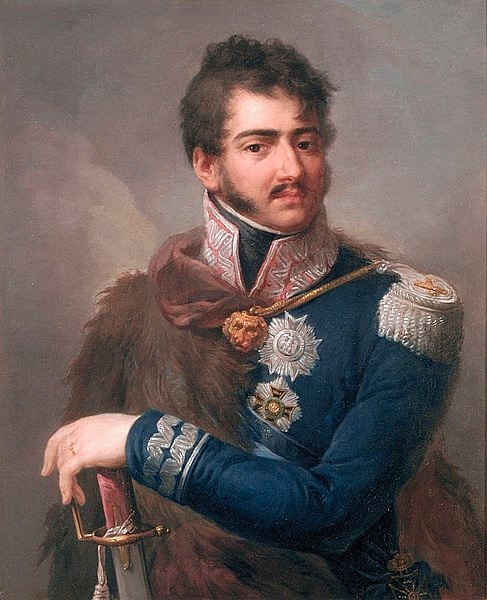
Prince Joseph Poniatowski
Le prince Joseph Poniatowski (1763-1813) était un soldat et un patriote polonais qui fut commandant en chef de l'armée polonaise pendant les guerres napoléoniennes (1803-1815). Allié indéfectible de l'empereur français Napoléon Ier (r. de 1804 à 1814 ; 1815), Poniatowski fut nommé maréchal de l'Empire français quelques jours seulement avant d'être tué à la bataille de Leipzig.
Lire la suite...
0 notes
Text
˚₊·—̳͟͞͞♡ Chibi Józef Poniatowski !!
I drew another drawing of my fav marshal !!

#józef poniatowski#napoleonic wars#napoleonic era#marshal#digital art#art#napoleonic marshals#joseph poniatowski
57 notes
·
View notes
Text
The ends of the Marshals
We know a lot about our marshals of empires, but for some their existence ends in 1814, I did some research and I did all the dates of death of the 26 marshals of the empire with their age of death and some information that I had, do not hesitate to say other information if you have any, when we look closely Lannes was the first to die and at a young age while the one who spent the most time on earth is Moncey who lived until 87 years old, yet it is Marmont who will be the last to die in 1852, I hope that this will be useful for some.
Shot:
-Murat, October 13, 1815 (trying to recover his former kingdom of Naples …) at 48 years old
-Ney, December 7, 1815 (judged as a traitor for having joined Napoleon in 1815) at 46 years old
Defenestrate: (throw at a window)
-Berthier, June 1, 1815 (suicide or murder?) at age 61
Killed in combat:
-Lannes, May 31, 1809, wounded in the leg, dies of his wounds, at age 40
-Bessières, May 1, 1813, wounded by a cannon (no chance of survival) at age 44
-Poniatowski, October 19, 1813, drowned during the battle of Liepzig, at age 50
assassinated:
-Brune, August 2, 1815 (victim of the white terror of 1815) at age 52
-Mortier, July 28, 1835 (killed in an attack) at age 67
illness:
-Davout, June 1, 1823 (probably of tuberculosis) at age 53
-Augereau, June 12, 1816, at age 58
-Masséna, April 4, 1817 (long-term ill) at age 58
-Gouvion Saint-Cyr, March 17, 1830 (stroke) at age 65
natural causes, old age: (Here it is mainly deaths from natural causes)
-Perignon, December 25, 1818, at age 64
-Serurier, December 21, 1819, at age 77
-Lefebvre, September 4, 1820, at age 64
-Kellermann, September 14, 1820, at age 85
-Suchet, January 3, 1826, at age 55
-Jourdan, November 23, 1833, at age 71
-MacDonald, September 25, 1840, at age 74
-Victor, March 1, 1841, at age 76
-Moncey, April 20 1842, at age 87
-Bernadotte, March 8, 1844 (died of a paralytic attack at age 81)
-Grouchy, May 29, 1847, at age 80
-Oudinot, September 13, 1847, at age 80
-Soult, November 26, 1851, at age 82
-Marmont, March 2, 1852, at age 77
#history#napoleonic era#napoleon's marshals#michel ney#joachim murat#louis nicolas davout#louis alexandre berthier#jean mathieu philibert sérurier#jean lannes#jean baptiste bessières#jean baptiste jourdan#jean baptiste bernadotte#joseph antoine poniatowski#pierre augereau#claude victor perrin#jean de dieu soult#edouard mortier#nicolas charles oudinot#emmanuel grouchy#auguste de marmont#louis gabriel suchet#etienne macdonald#catherine dominique perignon#françois joseph lefebvre#françois christophe kellermann#jean mathieu philibert serurier#adrien moncey#andré masséna#laurent gouvion saint-cyr
119 notes
·
View notes
Text
I am happy that I was able to delight your day with this! :)
Thank you for your detailed input, @northernmariette! Poniatowski not having a wife is a surprise for me. Someone really needs to update his English wiki page then because his page states/claims that he was married to Zelia Sitańska. I am going to correct Mardi Gras‘ birthday to February 1815 then. :)
As a case in point, while Marshal Augereau had no children by either of his two wives, it seems he got in trouble in his youth for impregnating one of the maids in the household where he was himself employed.
Damn you, Augerau, ahaha. Do you coincidentally know what happened with the child? When was it born? Did it survive its childhood?
His oldest son lived to age 28, I believe, only to die of disease during the Russian campaign.
Oh, so you would say that the dates for Marie Joseph Xavier (10 March 1785 - 15 December 1812) could be correct? He would have been 27 years old then. The source states that he died in Wilna.
and a branch of Marshal Murat's continued for at least some time in the US.
Oh, yeah, the son of the 8th prince of Murat has even some clips on YouTube. I believe that one of our Murat‘s grandsons married one of Berthier‘s granddaughters (or just his granddaughter, idk how many granddaughters Berthier had 🙃) so yeah. The living descendants of Murat are also descendants of Berthier. 😅
****************************
@captainknell I don‘t know why I would judge you for that. I don‘t mind marriages where both sides don‘t have any blood relation what so ever. The only problem I have with cousin marriages is the biological factor. I believe 12.5 % of their DNA align within both parties and that can cause health problems for the child it usually wouldn‘t have. Nevertheless, I am aware that cousin marriages were a big thing in earlier centuries, especially in royalty, and that they are happening even today. People just need to be aware what they are getting into. At the end of the day, it‘s not my business. :)
The napoleonic marshal‘s children
After seeing @josefavomjaaga’s and @northernmariette’s marshal calendar, I wanted to do a similar thing for all the marshal’s children! So I did! I hope you like it. c: I listed them in more or less chronological order but categorised them in years (especially because we don‘t know all their birthdays). At the end of this post you are going to find remarks about some of the marshals because not every child is listed! ^^“ To the question about the sources: I mostly googled it and searched their dates in Wikipedia, ahaha. Nevertheless, I also found this website. However, I would be careful with it. We are talking about history and different sources can have different dates. I am always open for corrections. Just correct me in the comments if you find or know a trustful source which would show that one or some of the dates are incorrect. At the end of the day it is harmless fun and research. :) Pre 1790
François Étienne Kellermann (4 August 1770- 2 June 1835)
Marguerite Cécile (15 March 1773 - 12 August 1850) Ernestine Grouchy (1787–1866)
Mélanie Marie Josèphe de Pérignon (1788 - 1858)
Alphonse Grouchy (1789–1864)
Jean-Baptiste Sophie Pierre de Pérignon (1789- 14 January 1807)
Marie Françoise Germaine de Pérignon (1789 - 15 May 1844)
Angélique Catherine Jourdan (1789/1791 - 7 March 1879)
1790 - 1791
Marie-Louise Oudinot (1790–1832)
Marie-Anne Masséna (8 July 1790 - 1794)
Charles Oudinot (1791 - 1863)
Aimee-Clementine Grouchy (1791–1826)
Anne-Francoise Moncey (1791–1842)
1792 - 1793
Bon-Louis Moncey (1792–1817)
Victorine Perrin (1792–1822)
Anne-Charlotte Macdonald (1792–1870)
François Henri de Pérignon (23 February 1793 - 19 October 1841)
Jacques Prosper Masséna (25 June 1793 - 13 May 1821)
1794 - 1795
Victoire Thècle Masséna (28 September 1794 - 18 March 1857)
Adele-Elisabeth Macdonald (1794–1822)
Marguerite-Félécité Desprez (1795-1854); adopted by Sérurier
Nicolette Oudinot (1795–1865)
Charles Perrin (1795–15 March 1827)
1796 - 1997
Emilie Oudinot (1796–1805)
Victor Grouchy (1796–1864)
Napoleon-Victor Perrin (24 October 1796 - 2 December 1853)
Jeanne Madeleine Delphine Jourdan (1797-1839)
1799
François Victor Masséna (2 April 1799 - 16 April 1863)
Joseph François Oscar Bernadotte (4 July 1799 – 8 July 1859)
Auguste Oudinot (1799–1835)
Caroline de Pérignon (1799-1819)
Eugene Perrin (1799–1852)
1800
Nina Jourdan (1800-1833)
Caroline Mortier de Trevise (1800–1842)
1801
Achille Charles Louis Napoléon Murat (21 January 1801 - 15 April 1847)
Louis Napoléon Lannes (30 July 1801 – 19 July 1874)
Elise Oudinot (1801–1882)
1802
Marie Letizia Joséphine Annonciade Murat (26 April 1802 - 12 March 1859)
Alfred-Jean Lannes (11 July 1802 – 20 June 1861)
Napoléon Bessière (2 August 1802 - 21 July 1856)
Paul Davout (1802–1803)
Napoléon Soult (1802–1857)
1803
Marie-Agnès Irma de Pérignon (5 April 1803 - 16 December 1849)
Joseph Napoléon Ney (8 May 1803 – 25 July 1857)
Lucien Charles Joseph Napoléon Murat (16 May 1803 - 10 April 1878)
Jean-Ernest Lannes (20 July 1803 – 24 November 1882)
Alexandrine-Aimee Macdonald (1803–1869)
Sophie Malvina Joséphine Mortier de Trévise ( 1803 - ???)
1804
Napoléon Mortier de Trévise (6 August 1804 - 29 December 1869)
Michel Louis Félix Ney (24 August 1804 – 14 July 1854)
Gustave-Olivier Lannes (4 December 1804 – 25 August 1875)
Joséphine Davout (1804–1805)
Hortense Soult (1804–1862)
Octavie de Pérignon (1804-1847)
1805
Louise Julie Caroline Murat (21 March 1805 - 1 December 1889)
Antoinette Joséphine Davout (1805 – 19 August 1821)
Stephanie-Josephine Perrin (1805–1832)
1806
Josephine-Louise Lannes (4 March 1806 – 8 November 1889)
Eugène Michel Ney (12 July 1806 – 25 October 1845)
Edouard Moriter de Trévise (1806–1815)
Léopold de Pérignon (1806-1862)
1807
Adèle Napoleone Davout (June 1807 – 21 January 1885)
Jeanne-Francoise Moncey (1807–1853)
1808: Stephanie Oudinot (1808-1893) 1809: Napoleon Davout (1809–1810)
1810: Napoleon Alexander Berthier (11 September 1810 – 10 February 1887)
1811
Napoleon Louis Davout (6 January 1811 - 13 June 1853)
Louise-Honorine Suchet (1811 – 1885)
Louise Mortier de Trévise (1811–1831)
1812
Edgar Napoléon Henry Ney (12 April 1812 – 4 October 1882)
Caroline-Joséphine Berthier (22 August 1812 – 1905)
Jules Davout (December 1812 - 1813)
1813: Louis-Napoleon Suchet (23 May 1813- 22 July 1867/77)
1814: Eve-Stéphanie Mortier de Trévise (1814–1831) 1815
Adelaide Louise Davout (8 July 1815 – 6 October 1892)
Laurent François or Laurent-Camille Saint-Cyr (I found two almost similar names with the same date so) (30 December 1815 – 30 January 1904)
1816
Marie Anne Berthier (19 February 1816 – 23 July 1878)
Louise-Marie Oudinot (1816–1909)
1817
Caroline Oudinot (1817–1896)
Caroline Soult (1817–1817)
1819: Charles-Joseph Oudinot (1819–1858)
1820: Anne-Marie Suchet (1820 - 27 May 1835) 1822: Henri Oudinot ( 3 February 1822 – 29 July 1891) 1824: Louis Marie Macdonald (11 November 1824 - 6 April 1881.) 1830: Noemie Grouchy (1830–1843) —————— Children without clear birthdays:
Camille Jourdan (died in 1842)
Sophie Jourdan (died in 1820)
Additional remarks: - Marshal Berthier died 8.5 months before his last daughter‘s birth. - Marshal Oudinot had 11 children and the age difference between his first and last child is around 32 years. - The age difference between marshal Grouchy‘s first and last child is around 43 years. - Marshal Lefebvre had fourteen children (12 sons, 2 daughters) but I couldn‘t find anything kind of reliable about them so they are not listed above. I am aware that two sons of him were listed in the link above. Nevertheless, I was uncertain to name them in my list because I thought that his last son died in the Russian campaign while the website writes about the possibility of another son dying in 1817. - Marshal Augerau had no children. - Marshal Brune had apparently adopted two daughters whose names are unknown. - Marshal Pérignon: I couldn‘t find anything about his daughters, Justine, Elisabeth and Adèle, except that they died in infancy. - Marshal Sérurier had no biological children but adopted Marguerite-Félécité Desprez in 1814. - Marshal Marmont had no children. - I found out that marshal Saint-Cyr married his first cousin, lol. - I didn‘t find anything about marshal Poniatowski having children. He was married though.
80 notes
·
View notes
Photo

Maréchal Poniatowski, Lithographie 1839
#maréchal#premier empire#french empire#joseph poniatowski#pologne#poland#napoléon bonaparte#lithographie#1839#grande armée#maréchal d'empire
34 notes
·
View notes
Text
If Napoleonic Figures were cats - part 2
MacDonald (Scottish bois must be Scottish folds)

Poniatowski

Mortier (Mortier is the tallest marshal of the Empire and therefore he shall be a Maine coon)

Moncey

Junot

Caulaincourt (CaulainKitty is a precious boi therefore he deserves 2 pics)


Larrey

Miloradovich

Wittgenstein

#napoleonic era shitposting#jacques macdonald#MacMarshal#bon adrien jeannot de moncey#the goodest boi#Józef Poniatowski#Édouard adolphe casimir joseph mortier#édouard mortier#tol boi#jean-andoche junot#dominique-jean larrey#everybody’s talking about larrey#caulaincourt#good ol’ caulaincourt#mikhail miloradovich#peter wittgenstein#napoleonic kitties#russian chonks#marshal floofs#tbh DD from Kittisaurus is the perfect casting of JunotKitty#if you guys like it i will do a part 3
40 notes
·
View notes